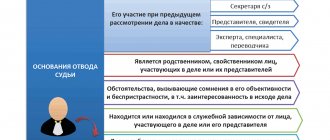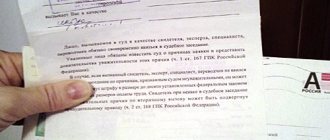Civil process is a form of protection of subjective rights, carried out by going to court. The process is based on a legal dispute, and the purpose of the court is to resolve it. Many participants are involved in the process. Their roles and procedural position differ, but all their actions lead to achieving the main goal of the process - the restoration of the violated rights and interests of the individual.
Concept and classification
The circle of participants in civil proceedings, the content of procedural actions, the possibility of their commission and non-completion, as well as responsibility for them are strictly defined by law. The sequence of these actions is determined by the requirements of civil procedural law or follows from the very logic of the development of the process.
There is a significant difference between the concepts of “participants in the process” and “participants in the case”. In the first case, this is everyone who is the subject of procedural legal relations in legal proceedings. In the second - only those who are interested in its outcome. Each participant in the process performs his own function, and no one can perform two functions at the same time. All of them become part of civil procedural activity and are subjects of separate procedural relations. They are divided into 3 categories:
- court;
- persons participating in the case;
- persons promoting the administration of justice.
The court is the main participant in the process, which administers justice on behalf of the state and directs the course of the process. Its function is to implement the rights and respect the interests of all subjects.
The persons involved in the case are the main participants in the process. They are divided according to their procedural role and the possibility of participation in types of legal proceedings. All of them are united by the presence of personal, state, public or other interest in the outcome of the process, as well as the ability to influence its course and result. These are:
- The parties are citizens and organizations defending their material and legal interests in court. The plaintiff (applicant, claimant) takes an active position and initiates the process. The plaintiff may represent his interests independently or through persons authorized to do so by law. The passive role belongs to the defendant (debtor) - the person who appears in court as an alleged violator of the rights and interests of the plaintiff.
- Third parties are those who enter into a process that has already begun, with or without separate requirements. Either party or both can become defendants to a third party.
- State bodies, organizations and officials whose actions are the subject of a legal dispute.
- Representatives of the party affected by the offense - the prosecutor, guardianship authorities, social protection. They are vested with all procedural rights and obligations of the parties, with the exception of those that require the personal presence of the party.
- citizens and organizations in special proceedings.
Persons contributing to the administration of justice are invited to participate in civil proceedings by the court and interested parties. They are not interested in the final result, but contribute to the establishment of the truth and help by providing the necessary information or in other ways. These are:
- Specialist – a person who has professional knowledge on the issues of the case under consideration. He gives advice and explanations, provides technical assistance (photography, selection of samples for examination, property assessment).
- An expert is a knowledgeable person invited to give an opinion on issues that arise for the court when establishing the circumstances of the case.
- A witness is a person who knows the facts and circumstances that are important for the correct resolution of the case.
- Translator is a person who speaks a foreign language.
- Assistant judge, court secretary - persons providing assistance in organizing and documenting civil proceedings.
The law also provides:
- Procedural complicity is the simultaneous participation of two or more persons as a plaintiff or defendant. They are called co-plaintiffs and co-defendants, respectively. The basis for complicity is the presence of homogeneous, interrelated claims of several persons, its purpose is to save time and legal costs.
- Procedural succession is the transfer of procedural rights and obligations from one person to another due to the transfer of subjective material rights to him. It may arise from a party or a third party with independent claims.
All persons participating in civil proceedings must have civil legal capacity and legal capacity. Persons promoting justice are subject to recusal if their interest is revealed or they provide unreliable or false information.
Lawyer's answers to questions about the composition of the court in civil proceedings
I learned that the defendant is a relative of the judge who is considering our dispute.
Can I file a motion to disqualify? Yes, the presence of family ties is grounds for disqualification. By law, the judge must do this himself, but you can file a motion.
How is the composition of the court determined?
The composition is formed taking into account the workload, taking into account the specialization of the judges, experience and workload at the sites.
I want to challenge the decision, which has not yet entered into force. Where should I file an appeal?
The appeal is filed with the court that made the contested decision. Subsequently, the documents are transferred to a higher authority.
Who should file a claim?
Lawsuits are received by the office and then transferred to assistant judges. You can submit the application in person or send it by registered mail with return receipt requested.
I need to apply for an order to collect child support from my ex-husband. Where to contact?
Magistrates' courts are involved in issuing orders (Article 23 of the Code of Civil Procedure of the Russian Federation).
Legal status of participants in civil proceedings
In court, only two subjects are connected by legal relations - the court and the participant in the process. The participants in the process have no such connection with each other. The court directs the actions of the participants in the process and is the guarantor of the observance of rights and the fulfillment of duties by all subjects. The powers of the court are exercised by judges appointed in accordance with the procedure established by law. The court may not include persons:
- related to each other;
- revealing bias in the case;
A judge who has considered a civil case in any one instance is not allowed to consider it in any other. To ensure the proper composition of the court, there is an institution of recusals. The right to challenge a judge belongs to all interested parties. If there are grounds, the judge must recuse himself.
Persons participating in the case have a whole range of procedural rights and obligations, which they must exercise fully and avoid irresponsibility and abuse. They actively participate in the case, defend their position in all legal ways: present evidence, participate in its study, get acquainted with the case materials, give explanations and ask questions to other participants, express their will regarding the claim.
The plaintiff and the defendant are equal before the law and the court. The burden of proving the validity of the claims rests with the plaintiff. The defendant, according to the presumption of innocence, is only suspected of committing an offense.
A third party with independent claims becomes a plaintiff and is endowed with the corresponding procedural rights and obligations. A third party who has not declared his claims acts on the side of the defendant or plaintiff to protect his interests. Third parties can join the case at their own request, at the request of other participants, at the invitation of the court, but exclusively on a voluntary basis.
The prosecutor participates in civil proceedings if a person, for health reasons or other reasons, cannot defend his rights and interests in court. The prosecutor can:
- initiate proceedings by filing a claim;
- enter into a process that has already begun.
In the first case, the prosecutor represents the plaintiff’s side in the process, in the second, he supervises the progress of the proceedings and is a guarantor of the correct resolution of complex cases. The prosecutor can participate in any civil case, where he will act as a legal advocate and representative of the state.
Unlike the prosecutor, government bodies participate only in cases of certain categories:
- on restriction of parental rights;
- on the recognition as void of transactions made in violation of legal norms;
- on the protection of copyrights, consumer rights, voters;
- on declaring a citizen incompetent;
In civil proceedings, public authorities can act as plaintiffs or advocates.
Persons representing the interests of the parties in court have all their procedural powers, with the exception of expressions of will, presentation of a writ of execution for collection and receipt of awarded property or money.
A member of the public participates in a trial of his own free will or on the initiative of persons involved in the case. He must impartially express to the court the opinion of the organization authorizing him regarding the case under consideration.
A witness gives truthful and impartial testimony to the court about circumstances relevant to the outcome of the case. A witness may be related or otherwise related to the participants in the case, but at the same time, the law allows him not to testify against himself or his family members.
During a court hearing, a specialist and an expert express their professional judgments regarding issues that are important for making a decision. They cannot participate in the process if:
- are related to any of the persons participating in the case or their representatives;
- have official or other dependence on them.
All participants in the process are obliged to appear at court hearings on time and to honestly and conscientiously contribute to the administration of justice.
This is interesting.
Latin phrases about civil procedure (from Roman law).
Nemo judex sine actore. There is no plaintiff, there is no court , i.e. the proceedings are terminated the moment the plaintiff ceases to apply for it.
Audiatur et altera pars. Let them listen to the other side too . Each party has an equal right to speak and listen in court.
Quod non est in actis est in mundo. What is not in practice is not in the world . All facts must be recorded in documents.
Judex ne eat ultra petita partium. The court should not go beyond the requirements of the parties.
Jura novit curia. The court knows the laws , i.e. it is better for the court to know which laws should be applied based on the results of consideration of the declared dispute, regardless of the presence or absence of a reference to these laws by the parties themselves.
Sententa ferri debet secundum allegata et probata, non secundum conscientiam. The decision must be made on the basis of presented and proven circumstances, and not on the conviction of conscience .
Functions of the judiciary
The judicial system performs many tasks aimed at establishing justice, fairness, and regulating order. Among the most important functions it is worth highlighting:
- analysis of administrative, civil, constitutional and criminal cases in the manner established by procedural legislation;
- interpretation of legal norms, creation of precedents, as well as the formation of proposals for improving the judicial system;
- certification of legal facts;
- control of powers.
In addition, the powers of the judiciary are conventionally divided into leading (basic) and additional:
- leading – execution of justice, constitutional supervision;
- additional – monitoring the legality and constructiveness of the regulation of the activities of government bodies, execution of sentences, participation in the creation of the judiciary.
Does a representative need a legal education in 2021?
Another required document may be a law degree or a scientific degree in the legal field. Until 2021, there was no mention of this in the law. However, amendments were made to the law that significantly changed the current situation.
In a number of lawsuits, the representative of the defendant or plaintiff must prove to the court that he has a professional legal education. This can be confirmed by presenting educational documents:
- Diploma of completion of an educational institution
- Certificate of academic degree in law
If the case is heard by a magistrate judge or a federal district court judge, you do not need to prove your education. But if the decisions of these courts were appealed and the case was transferred to a higher court, having a legal education will be mandatory.
The education document must be presented in the original. A copy is acceptable if its authenticity is duly certified. You can obtain a copy of the diploma from any notary.
Defense side
Defense in criminal proceedings includes:
- The accused . A person whose degree of guilt in committing a criminal offense is established by a court is called the accused. A verdict of guilty or acquittal is made against the accused. It should be noted that until the sentence comes into force, the guilt of the person is not established. In addition, the Code of Criminal Procedure identifies a person of defense as a suspect. This should be understood as a citizen against whom investigative actions are underway, but charges have not yet been brought against him.
- Lawyer. In accordance with the law, persons against whom criminal cases are being considered can count on legal assistance in the form of representation of their interests by a lawyer. In this case, the suspect or accused may refuse a lawyer, carrying out the defense on his own.
- Legal representatives . The legal representatives of the latter are involved as a party to legal proceedings where the accused are minor citizens.
- Civil defendants . They should be understood as persons who are brought to property liability arising from the commission of a criminal act. Civil defendants have the right to use the services of a representative.
How to formalize an agreement with a representative?
Previously it was stated that a contract or agreement was necessary. The most important thing is to discuss all the essential conditions, namely:
- How much work should a representative do?
- How much will legal representation cost?
- In what order and within what time frame will payment be made?
Naturally, there is no need to draw up such an agreement with a notary. The presence of the signatures of the customer and the contractor will be quite sufficient for the contract to have the necessary legal force.
If desired, the parties can change it at any time, for example, adjust the subject of the agreement or the terms of the procedure and amount of remuneration for the representative. Any changes must be formalized in the same way as the contract itself, that is, in writing.
The judicial system in the Russian Federation
The Russian Federation is characterized by a branched judicial system, representing an association of courts with common functions and activities. Based on the law “On the Judicial System of the Russian Federation” according to the territory of its coverage, all judicial entities are divided into federal courts - Supreme and Constitutional, regional, district, military, special and regional within federal cities.
The judicial power of the Russian Federation is considered to be autonomous and exists free of legislative and executive power. Russia has the following court system:
- statutory and constitutional (headed by the Constitutional Court) – conduct constitutional control;
- general jurisdiction (main Supreme Court) - perform all types of legal proceedings;
- arbitration courts (the main Supreme Arbitration Court) – deal with legal disputes.










